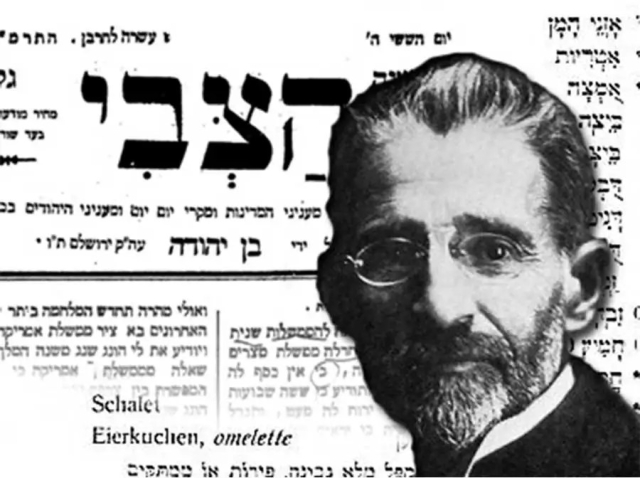On January 7th, 1858, Eliezer Ben-Yehuda, widely considered the one to resurrect biblical Hebrew and develop it into a modern language, is born as Eliezer Yitzchak Perelman in the Lithuanian village of Luzhky under the rule of the Russian Empire.
Expected to become a rabbi by his teachers due to his extremely intellectual mind, Ben-Yehuda instead became interested in secular studies and exchanged the yeshiva education for a Russian gymnasium, where he graduated in 1877. Ben-Yehuda would eventually become involved in the fight for the sovereignty of nations under Ottoman Empire rule, such as the Bulgarian struggle for independence.
Today we mark the 160th birthday of Eliezer Ben Yehuda, a visionary linguist who realized the dream of transforming the ages-old #Hebrew to meet the modern needs of life in the Land of Israel.
— Israel ישראל (@Israel) January 7, 2018
WATCH how today's Hebrew was brought to life by one outstanding man: 📚🇮🇱 pic.twitter.com/11hIcYfMrJ
Naturally, Ben-Yehuda became drawn to the idea of the Jewish people regaining their historical home in Palestine. One of his earliest Zionist pieces showing his advocacy was published in 1879 and called “She’elah Lohatah” (“A Burning Question” in Hebrew).
In that and many other Zionist articles to come, Ben-Yehuda addressed Jewish efforts to resettle Palestine, the revival of Hebrew as a modern language, and the importance of a national homeland for the Jewish people as a global cultural center.
165 years ago today, Eliezer Ben Yehuda was born. Eliezer was the driving spirit behind the revival of the Hebrew language in the modern era. pic.twitter.com/CLctnTV9Kg
— Time To Stand Up For Israel (@SabineSterk) January 8, 2023
Abandoning a plan to pursue a medical degree in Paris, Ben-Yehuda instead moves with his wife to Jerusalem in 1881, adopting a new political ideology that would keep him determined to speak only Hebrew at home, as well with other fellow Jews. He would devote his entire life to the promotion of Hebrew as the official language used by schools in Ottoman-ruled Palestine. Later in his life, Ben-Yehuda would write and publish the first modern Hebrew dictionary, creating new terms for hundreds of modern things such as ice cream and bicycles.
His approach to making Hebrew the everyday language of the Jewish people in their homeland would be promoted with the motto “Hebrew in the home and Hebrew in the school.”
#OnThisDay📅
— Act-IL (@Act_On_) January 7, 2023
Today marks 165 years since Eliezer Ben Yehuda, best known for reviving #Hebrew as a modern spoken language, was born.
He created the first modern Hebrew-speaking household and raised the first modern Hebrew-speaking child!
What is your favorite Hebrew word? 💬 pic.twitter.com/VEutCXRuFC
At the time, due to almost 2 millennia in The Diaspora, Jews spoke many different languages such as Yiddish, Arabic, Ladino, and more. The early Zionist movement recognized the importance of unifying the Jewish people not only in ideology but in language as well, therefore turning Ben-Yehuda into one of the leading figures of Zionism at the time. He would pass away in December of 1922, witnessing the liberation of many states from Ottoman rule, leaving behind an established Zionist settlement within the new British Mandate that strictly used Hebrew as its official language for all internal and external affairs.


